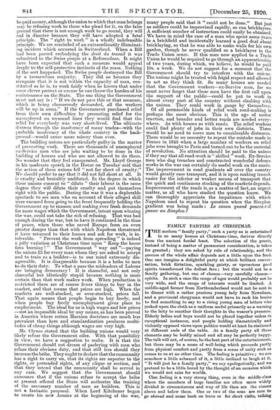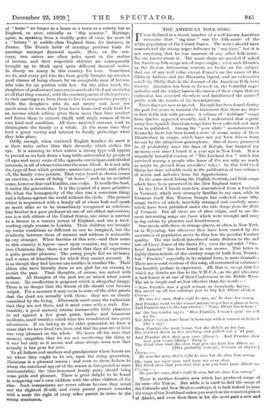FAMILY PARTIES AT CHRISTMAS.
THE modern " family party," such a party as is entertained in so many houses at Christmas-time, derives directly from the ancient feudal feast. The selection of the guests, instead of being a matter of paramount consideration, is taken for granted ; they are asked by rule of relationship, and the success of the whole affair depends not a little upon the food. One can imagine a delightful party at which brilliant conver- sation, brisk flirtation, sparkling gaiety, or uproarious good spirits transformed the dullest fare ; but this would not be a family gathering, but one of chosen—very carefully chosen— spirits. In such a case the range of ages would probably not be very wide, and the range of interests would be limited. A middle-aged farmer from Northumberland would not be sent in to dinner with a rather precious young lady from Newnham, and a provincial clergyman would not have to rack his brains to find something to say to a rising young man of letters who looked upon the cloth as a uniform useful primarily as a warning to the laity to smother their thoughts in the wearer's presence. Elderly ladies and boys would not be placed together unless in exceptional instances, and people holding diametrically and violently opposed views upon politics would at least be stationed at different ends of the table. At a family party all these elements may be boldly mixed and all may be perfectly happy. The talk will not, of course, be the best part of the entertainment, but there may be a sense of well-being which proceeds partly from physical comfort and partly from a sense of unity such as comes to us at no other time. The feeling is primitive ; we aro somehow a little ashamed of it, a little inclined to laugh at it. " It will just be a family party," we say apologetically, and we pretend to be a little bored by tho thought of an occasion which we would not miss for worlds.
Clan feeling is a very strong thing, oven in the middle-class where the members of large families am often more widely divided in circumstances and way of life than are the classes above and below them. One or two of the sons are sure to go abroad and come bask on leave or for short visits, talking of " home " no longer as a house or a town or a county but as England, or more critically as " this country." Marriage, again, is, speaking from a worldly point of view, far more of a " lottery " in middle-class England than, for instance, in France. The French habit of marriage portions leads to marriage amongst financial equals. Hero, on the con- trary, two sisters are often poles apart in the matter of income, and their respective children are consequently brought up to think upon quite different financial scales. In theory we marry in this country for love. Sometimes we do, and every girl who has been gently brought up stands a good chance of being chosen by an acceptable man of fortune who asks for no portion with her. On the other hand, the daughters of professional men are so much afraid of not marrying at all that they consent, with the encouragement of their parents, to such marriages as force them to live in comparative poverty ; while tho daughters who do not marry and have too much sense to waste their lives leave home and work hard for an income which seldom gives thorn more than bare comfort and forces them to consort chiefly with single women of their own kind and condition. All these national customs tend to disintegrate the family as a whole. At the same time they lend a great variety and interest to family gatherings when they take place.
Oddly enough, when scattered English families do meet it is their unity rather than their diversity which strikes the eye. It is amazing to what extent a strong typo will appear to prevail as we look down a long table surrounded by people of all ages and many ways of life, opposite convictions,and divided interests, in all of whose veins runs the same blood. It is not only the type of face which persists ; mannerisms persist, and, above all, the family voice persists. That voice heard in chorus rouses an emotion, a sense of being "at home" such as no revisited scone, however. dear and familiar, can evoke. It recalls the dead, it unites the generations. It is the symbol of a more primitive life when the homogeneity of the clan was a conscious thing, and a defence against the world without the circle. The present writer is acquainted with a family all of whom look and speak so much alike as to be immediately recognized as relations. One brother is a poor professor at one of our oldest universities, one is a rich citizen of the United States, one sister is married to a farmer in a remote corner of England, and one a hard- working single woman in London. Their children are brought up under conditions as different as can be imagined, but the similarity between them of manner and address is noticeable to any stranger. When families of this sort—and their name in this country is legion—meet upon cccasion, say upon some rare Christmas Day, there is no doubt that they all experience a quite peculiar pleasure. The young people feel an intimacy and a sense of friendliness for which they cannot account. It is as though they had known one another in another life. Their elders who have literally done so are glad for an evening to revisit the past. Their thoughts, of course, are mixed with sadness. All thoughts of the past are so mixed when youth is over. No recollection is poignant which is altogether happy. There is no danger that the drama of life should over become nsipid. For a moment it may seem to some of the older guests that the dead are actually with them : they are so closely resembled by the living. Afterwards must come the realization that they are not there, and it must come with a stab. For- tunately, a good memory retains innumerable little pleasures to set against a few groat pains, tender and humorous incidents, small troubles which time has transformed into great adventures. If we belong to the elder generation we have a sense that we have lived two lives, and that the past one at least was very pleasant on the whole. We know all the time that memory magnifies, that we are not recollecting the thing as it was but only as it seems, and must always seem now that actually it has gone for ever. To all fathers and mothers and grandparents whose hearts are set where they ought to be set, upon the rising generation, Christmas is a pleasant season ; and even to those fathers to whom the emotional appeal of the season is disregarded as mere sentimentality, the time-honoured family party should bring some pride and pleasure. There is great delight to be found in comparing one's own children with the other children of the clan. Such comparisons aro never odious because they entail not the slightest and every parent present concedes with a smile the right of every other parent to come to the wrung conclusion.



































 Previous page
Previous page